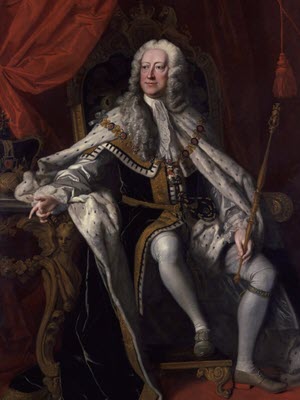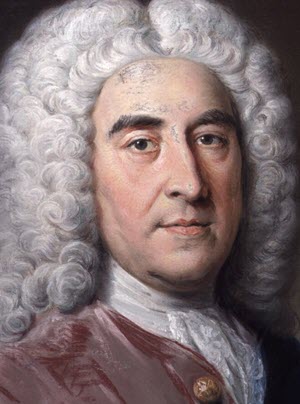| |
Date |
Event(s) |
| 1 | 1727 | - 11 Jun 1727—25 Oct 1760: King George II's reign

George IIexercised little control over British domestic policy, which was largely controlled by the Parliament of Great Britain. As elector, he spent twelve summers in Hanover, where he had more direct control over government policy.
During the War of the Austrian Succession, George participated at the Battle of Dettingen in 1743, and thus became the last British monarch to lead an army in battle. In 1745, supporters of the Catholic claimant to the British throne, James Francis Edward Stuart ("The Old Pretender"), led by James's son Charles Edward Stuart ("The Young Pretender" or "Bonnie Prince Charlie"), attempted and failed to depose George in the last of the Jacobite rebellions.
|
| 2 | 1757 | - 29 Jun 1757—26 May 1762: Duke of Newcastle - 6th British Prime Minister

Thomas Pelham-Holles, 1st Duke of Newcastle upon Tyne and 1st Duke of Newcastle-under-Lyme, was a British Whig statesman, whose official life extended throughout the Whig supremacy of the 18th century. He is commonly known as the Duke of Newcastle. Historian Harry Dickinson says that he became, "Notorious for his fussiness and fretfulness, his petty jealousies, his reluctance to accept responsibility for his actions, and his inability to pursue any political objective to his own satisfaction or to the nations profit ... Many modern historians have depicted him as the epitome of unredeemed mediocrity and as a veritable buffoon in office."
|
| 3 | 1760 | - 25 Oct 1760—29 Jan 1820: King George III's reign

George III was the third British monarch of the House of Hanover, but unlike his two predecessors, he was born in Great Britain, spoke English as his first language, and never visited Hanover. His reign was marked by a series of military conflicts involving his kingdoms, much of the rest of Europe, and places farther afield. Early in his reign, Great Britain defeated France in the Seven Years' War, becoming the dominant European power in North America and India. However, many of Britain's American colonies were soon lost in the American War of Independence. Further wars against revolutionary and Napoleonic France from 1793 concluded in the defeat of Napoleon at the Battle of Waterloo in 1815.
Later in life, George III had recurrent mental illness. After a final relapse in 1810, a regency was established, and George III's eldest son, George, Prince of Wales, ruled as Prince Regent.
|
| 4 | 1762 | - 26 May 1762—8 Apr 1763: Earl of Bute - 7th British Prime Minister

John Stuart, 3rd Earl of Bute, was a British nobleman who served as Prime Minister of Great Britain from 1762 to 1763 under George III.
Bute's premiership was notable for the negotiation of the Treaty of Paris (1763) which concluded the Seven Years' War. In so doing, Bute had to soften his previous stance in relation to concessions given to France, in that he agreed that the important fisheries in Newfoundland be returned to France without Britain's possession of Guadeloupe in return.
|
| 5 | 1763 | - 16 Apr 1763—10 Jul 1765: George Grenville - 8th British Prime Minister

George Grenville (14 October 1712 – 13 November 1770) was a British Whig statesman who rose to the position of Prime Minister of Great Britain. Grenville was born into an influential political family and first entered Parliament in 1741 as an MP for Buckingham. He emerged as one of Cobham's Cubs, a group of young members of Parliament associated with Lord Cobham.
His government tried to bring public spending under control and pursued an assertive foreign policy. His best known policy is the Stamp Act, a common tax in Great Britain onto the colonies in America, which instigated widespread opposition in Britain's American colonies and was later repealed.
|
| 6 | 1765 | - 13 Jul 1765—30 Jul 1766: Marquess of Rockingham - 9th British Prime Minister

Charles Watson-Wentworth, 2nd Marquess of Rockingham, was a British Whig statesman, most notable for his two terms as Prime Minister of Great Britain. He became the patron of many Whigs, known as the Rockingham Whigs, and served as a leading Whig grandee. He served in only two high offices during his lifetime (Prime Minister and Leader of the House of Lords), but was nonetheless very influential during his one and a half years of service.
Rockingham's administration was dominated by the American issue. Rockingham wished for repeal of the Stamp Act 1765 and won a Commons vote on the repeal resolution by 275 to 167 in 1766. However Rockingham also passed the Declaratory Act, which asserted that the British Parliament had the right to legislate for the American colonies in all cases whatsoever.
|
| 7 | 1766 | - 30 Jul 1766—14 Oct 1768: Earl of Chatham - 10th British Prime Minister

William Pitt, 1st Earl of Chatham, (15 November 1708 – 11 May 1778) was a British statesman of the Whig group who led the government of Great Britain twice in the middle of the 18th century. Historians call him Pitt of Chatham, or William Pitt the Elder, to distinguish him from his son, William Pitt the Younger, who also was a prime minister. Pitt was also known as The Great Commoner, because of his long-standing refusal to accept a title until 1766.
Pitt is best known as the wartime political leader of Britain in the Seven Years' War, especially for his single-minded devotion to victory over France, a victory which ultimately solidified Britain's dominance over world affairs. He is also known for his popular appeal, his opposition to corruption in government, his support for the colonial position in the run-up to the American War of Independence, his advocacy of British greatness, expansionism and colonialism, and his antagonism toward Britain's chief enemies and rivals for colonial power, Spain and France.
|


